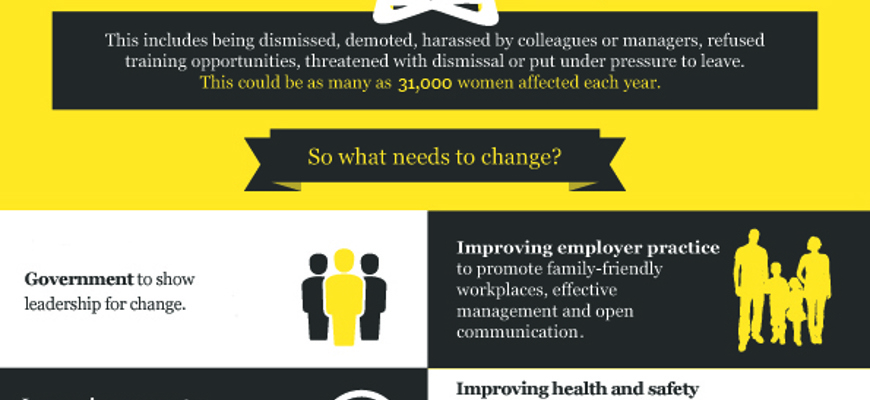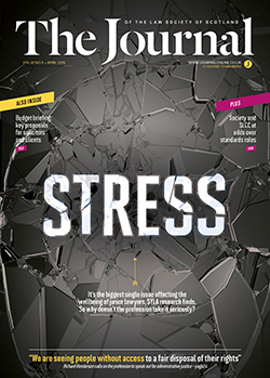Maternity: still black marks

Three out of four Scottish working mothers experience pregnancy and maternity discrimination, according to the Equality & Human Rights Commission (EHRC).
The EHRC has published in-depth research into pregnancy and maternity discrimination, which found that over 30,000 Scottish women will have had a negative or possibly discriminatory experience at work whilst they are pregnant or on maternity leave. Three quarters of mothers who reported feeling forced to leave their jobs, said they had experienced more than 10 types of negative experience, including risks to their health or welfare, financial loss and harassment.
An overwhelming majority (94%) of Scottish employers felt that it was in the best interests of the organisation to support pregnant women and those on maternity leave, but 73% of Scottish mothers reported a negative or discriminatory experience.
Fewer than 1% of women pursued a claim to the employment tribunal. The research shows a range of reasons for this, including the financial cost of pursuing a claim, fear of negative repercussions at work, lack of information about their rights, and stress and tiredness.
The issues identified in the research and their scale are cause for urgent attention, and the EHRC has identified six areas for action including improving access to justice by removing barriers for women raising complaints. The EHRC is of the view that if communication and complaints procedures fail to resolve an issue, women should be able to secure redress though the employment tribunal without the barrier of tribunal fees. The Scottish Government has made a commitment to use the new powers being devolved under the Scotland Act 2016 to abolish employment tribunal fees (Scottish Government (September 2015), A Stronger Scotland, the Government’s Programme for Scotland 2015-16).
The EHRC has also recommended to the UK Government that it consider increasing the time limit for bringing employment tribunal claims from three months to six months.
The Scottish Government has responded to the research by announcing the following measures:
- a new working group to create guidelines for employers to ensure best practice on recruitment, retention and development of pregnant workers;
- including best practice in managing pregnancy and maternity appropriately within the Scottish Business Pledge;
- strengthening employer advice to ensure that work environments are safe and healthy for pregnant women and new mothers, including providing employment rights information;
- improving public monitoring and reporting of pregnancy and maternity under the Scottish Public Sector Equality Duty (PSED).
The EHRC has developed a number of tools to support employers to improve how they manage pregnancy and maternity. These are available here.
In this issue
- Family ADR: why the slow takeup?
- Electronic cigarettes: the medicine of tomorrow?
- Official advice: must do better
- Privacy Shield, the new Safe Harbor
- Maternity: still black marks
- Designed for justice
- Reading for pleasure
- Opinion: Tim Musson
- Book reviews
- Profile
- President's column
- 20 is the new 40
- People on the move
- Stress: the common enemy
- A safer way to talk
- Mind the gap
- SLCC: a role in standards?
- Budget 2016: a spoonful of sugar?
- Rights lost to sight?
- Take care with care services
- How the Sheriff Appeal Court fits in
- Extended liability?
- Periti credere? [Experts believe]
- What's happening on the review
- Scottish Solicitors' Discipline Tribunal
- Deeds of conditions: emerging stronger
- In-house and staying in demand
- Further warning over historic client balances
- Law reform roundup
- Perceptions and priorities
- Training is the key
- Ask Ash
- By diverse means
- The literal truth






